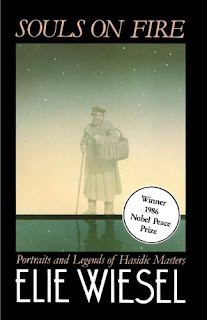Review of Souls on Fire: Portraits and Legends of Hasidic Masters by Elie Wiesel:
Some of you may remember that at the height of the Covid-19
pandemic in New York City there was a funeral of an ultra-Orthodox Jewish rabbi
that drew thousands of non-social-distancing mourners which incurred the tweeted
criticism of NYC’s mayor, Bill de Blasio.
In witnessing the scene on news outlets many “sheltering-in-place”
viewers may have wondered what in the heck these clad-from-head-to-foot- in-black
devotees were thinking! Were they
utterly oblivious to the dire threat that the virus posed for such
gatherings? Were they crazed, reckless,
or what? What they were was Hasidim, a
sect within Judaism that has its origins in 18th century eastern
Europe. What they are is deeply fervent
in their faith and, yes, in their dedication to and love for their spiritual
leaders, especially of their dynastic heads known as rebbes of which Rabbi
Chaim Mertz was one. If this incident pricked your curiosity about the Hasidim,
you may want to check out Elie Wiesel’s portrait of the original Hasidic
masters, Souls on Fire.
Elie Wiesel is best known for his book Night which
deals with the nightmare that he, himself, lived through, the Holocaust. In Souls on Fire he travels back into
his own religious roots that have their firm footing in the Hasidic
movement. Beginning with its founder,
Israel Baal Shem Tov, Wiesel not only relates the stories about these mystics
of the Jewish tradition, but he shares some of the incredibly insightful
stories that they told.
And insightful they are.
Here is a simple favorite of mine not found is this book. A young
rabbinical student goes to his teacher perplexed with delineating between a
colon and God’s name in the bible. His
teacher explains, “When one dot is above another, God is never present. When one dot is beside another, God is always
present.”
In the tribute that precedes the first chapter, Wiesel gives
recognition to his father and grandfather.
He writes: “My father, an enlightened spirit, believed in man. My grandfather, a fervent Hasid, believed in
God. The one taught me to speak, the
other to sing. Both loved stories.”
I suspect you will love these stories, the ones about these first
heralds of the Hasidic tradition, but even more so the ones they told.
Reviewed by Richard Dick, Library Assistant, O’Kelly
Memorial Library





Comments
Post a Comment